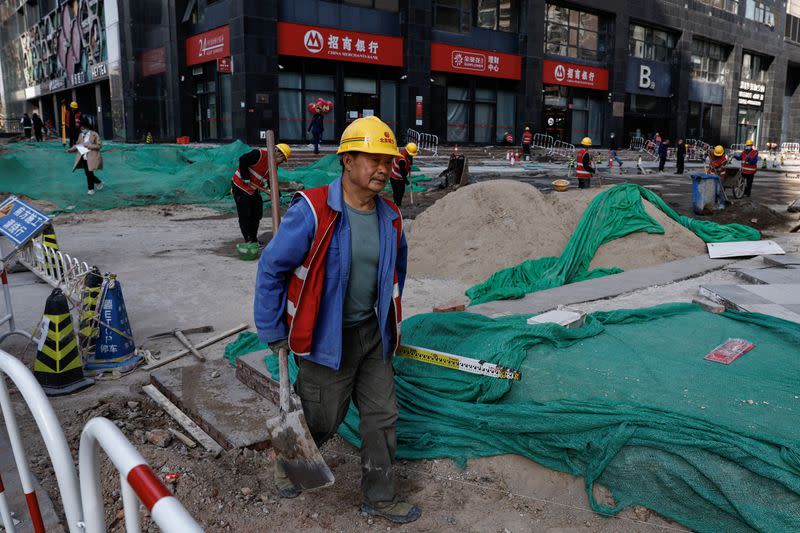China’s economy expanded by a faster-than-expected 5.3% in the first quarter, according to official data released on Tuesday.
But other data released by the National Statistics Bureau on retail sales, industrial output and property investment showed that the domestic economy is struggling with frail demand, plus impacts from protracted weakness in the property sector and rising local government debt.
The government has unveiled a raft of fiscal and monetary policy measures in a bid to achieve what analysts have described as an ambitious 2024 GDP growth target of around 5%, noting that last year’s growth rate of 5.2% was likely flattered by a rebound from a Covid-hit 2022.
ALSO SEE: China Providing 90% of Chips Used in Russia, Despite Sanctions
Gross domestic product (GDP) grew 5.3% in January-March from the year earlier, which was well above analysts’ expectations in a Reuters poll for a 4.6% rise and slightly faster than the 5.2% expansion in the previous three months.
“The strong first-quarter growth figure goes a long way in achieving China’s ‘around 5%’ target for the year,” Harry Murphy Cruise, an economist at Moody’s Analytics, said.
Consumers not spending
“Industrial production also supported through the quarter, but weak March data is cause for some concern. Similarly concerning, China’s households continue to keep their wallets closed.”
On a quarter-by-quarter basis, GDP grew 1.6% in the first quarter, above the forecast for growth of 1.4%.
The world’s second-largest economy has struggled to mount a strong and sustainable post-Covid bounce, burdened by a protracted property downturn, mounting local government debts and weak private-sector spending.
Fitch cut its outlook on China’s sovereign credit rating to negative last week, citing risks to public finances as Beijing channels more spending towards infrastructure and high-tech manufacturing.
The government is drawing on infrastructure work – a well-used playbook – to help lift the economy as consumers are wary of spending and businesses lack confidence to expand.
GDP data taken with a pinch of salt
The economy was off to a solid start this year, but March data on exports, consumer inflation, producer prices and bank lending showed that momentum could falter again and reinforced calls for more stimulus to shore up growth.
Indeed, separate data on factory output and retail sales, released alongside the GDP report, underlined the persistent weakness in domestic demand.
Industrial output in March grew 4.5% from a year earlier, compared with a forecast increase of 6.0% and a gain of 7.0% for the January-February period.
Growth of retail sales, a gauge of consumption, rose 3.1% year-on-year in March, against a forecast increase of 4.6% and slowing from a 5.5% gain in the January-February period.
Fixed asset investment grew an annual 4.5% over the first three months of 2024, versus expectations for a 4.1% rise. It expanded 4.2% in the January-February period.
“On the face of it, the headline number looks good… but I think the momentum is actually quite weak at the end,” Alvin Tan, head of Asia FX strategy at RBC Capital Markets in Singapore, said.
Following the improved first-quarter GDP outcome, economists at ANZ raised their 2024 China growth forecast to 4.9% from 4.2% previously, while BBVA maintained their 4.8% growth projection.
Most investors appeared to take the headline GDP surprise with a pinch of salt given the weakness of the March data.
Traders said China’s state-owned banks were selling dollars to steady the yuan in the onshore market. China stocks were tracking broader markets lower as geopolitical tensions in the Middle East sapped risk sentiment.
Home prices plunge
The crisis in the property sector has been a major drag on China’s economy as it has rippled across business and consumer confidence, investment plans, hiring decisions and stock prices.
The March data highlighted the depth of the troubles in the sector, with investor confidence and demand still at a low ebb.
China’s new home prices fell at their fastest pace in more than eight years last month as debt troubles among property developers hurt demand.
Property investment slumped 16.8% year-on-year in March, worse than a 9.0% drop in January-February, while sales tumbled 23.7%, compared with a 20.5% fall in the first two months of the year.
With the Federal Reserve and other developed economies showing no urgency to start cutting interest rates, China may also face a longer period of subpar export growth in a further blow to policymakers’ hopes of engineering a strong economic recovery.
Adding to the challenge for China, authorities also have to contend with ongoing tensions with the United States over trade, technology and geopolitics.
Investors are looking to an expected Politburo meeting in April for clues on policy direction, though few analysts expect any major stimulus.
The People’s Bank of China (PBOC) has pledged to step up policy support for the economy this year, with markets betting on further cuts in banks’ reserve requirement ratio and interest rates.
Some analysts believe the central bank faces a challenge as more credit is flowing to production than into consumption, exposing structural flaws in the economy and reducing the effectiveness of its monetary policy tools.
Looking ahead, Jinyue Dong, senior economist at BBVA research, said he believes the “recovery has not got a solid foundation yet as the deep adjustment of real estate market and local government debt overhang still remain the main risks.”
“In addition, geopolitics risks mostly due to China-US confrontations before the US president elections will persist in the foreseeable future.”
- Reuters with additional editing by Jim Pollard
ALSO SEE:
EU to Avoid Trade Curbs in China Solar Panel Firms Battle
China Orders Telecoms to End Use of US Chips by 2027 – WSJ
Excess Capacity Claim is Wrong, We’re More Competitive: China
Yellen Warning to China on Oversupply Seen Falling on Deaf Ears
US-China Need ‘Tough’ Conversations, Yellen Tells Li Qiang
China’s Solar Sector Seen Facing Years of Oversupply, Low Prices
PM Pledges to Revitalize China’s Economy, Aims at 5% Growth
























